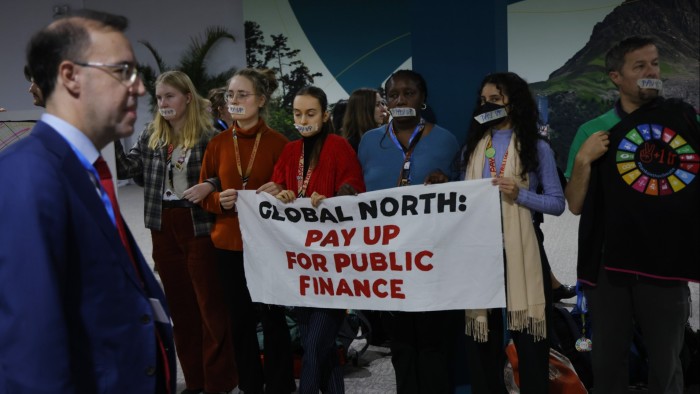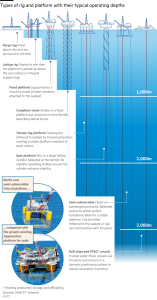The climate cash that’s not going to come

This article is an on-site version of our Trade Secrets newsletter. Premium subscribers can sign up here to get the newsletter delivered every Monday. Standard subscribers can upgrade to Premium here, or explore all FT newsletters
Welcome to Trade Secrets. Well, the COP29 climate change conference has ended with the usual outcome. That is, they pulled something out of the bag, in this case an announcement on climate finance, but opinion is divided over its value. My view is — wait for it — sceptical, for which see below. I also urge everyone not to over-interpret president-elect Donald Trump’s economics and trade appointments. Charted Waters is on Eurozone and US growth prospects.
A happy Thanksgiving to those who celebrate, and this week’s question for you: if you had to rate the Federal Reserve’s willingness to stand up to Trump trying to devalue the dollar (as mentioned in today’s second piece and also here), where would you put it on a range of one to 10? Email me at [email protected].
Get in touch. Email me at [email protected]
Stop me if you’ve heard these aid pledges before
So COP29 (it stands for the Conference of the Parties, no one notes that any more, but it does) in the murky petrostate of Azerbaijan ends with a supposed agreement on climate finance. As a veteran of the debates over development aid volumes in the 2000s, I recognise the phenomenon: multiyear totals rolled together to make them look bigger, implausible leveraging estimates, relabelling existing aid spending as climate-related, ethereal aspirations that somehow morph into ambitions, then into targets and pledges without acquiring any genuine solidity along the way.
For once I’m with India. Although Delhi’s own green multilateralist credentials look very soot-blackened (see what I did there?), after weakening COP promises on carbon emissions and blocking discussions about the environment at the World Trade Organization, it correctly called this deal woefully insufficient. Trade folk were again dutifully enthused that there was something called a “climate finance, investment and trade day” and a “trade and investment pavilion” at the convention. But without many policymaking processes to feed ideas into, it’s not clear to me what use designated days and pavilions are.
The most substantive, optimistic take I’ve heard is from FT colleague Pilita Clark, who reports that there is some genuine movement towards raising taxes, such as levies on airline tickets, for climate finance. This is another familiar discussion from development aid debates of yore. A constructive move, sure, but it has the usual problems with sin taxes — the more they work as a deterrent to carbon emissions, the less you get in aid.
Alongside me in Camp Cynical on the overall worth of climate pledges is development economist Charles Kenny (who btw has also been commendably optimistic on development and poverty reduction itself). He points out here the legerdemain involved. As Kenny says, and as I wrote recently, the claim in particular that small amounts of public money will leverage in a lot of private capital is one of the biggest canards out there.
So guess who shares some of this scepticism? Surprisingly to me, Ajay Banga, president of the World Bank. Banga dropped by the FT for an interview recently and said of private finance: “It is not a panacea for everything. This idea that the trillions are waiting in the private sector to rush into the development of a poor emerging market country — that’s not what I’m telling you”. Banga added: “Please write that for me, because otherwise everyone goes round saying I just talk about the private sector.” So here I am writing it; there’s one climate pledge fulfilled. Tick.
But as I noted in last week’s Trade Secrets column, Banga also said that prospective renewable energy projects in middle-income countries, which really might make a big difference to carbon emissions, often have what looks like a strong business case. As it happens, that’s also what the data shows, at least in relative terms. This chart indicates that private investment is involved in more projects in power generation than in any other infrastructure category.
So why isn’t there yet more? That’s what the bank’s private sector investment lab is all about fixing, which I’ll come back to another time.
The Beltway gossip we should discount
Pick your power-broking metaphor. A puff of white smoke arises from Mar-a-Lago and the Treasury has a new Pope. Or there are cries and thuds as the corpses of failed candidates are tossed out of the windows of the Florida annex of the Topkapi Palace at dead of night, and Trump’s Ottoman Empire has a new vizier of finance. (Hat-tip to UC Berkeley’s Brad DeLong for pioneering the Topkapi allusion in this context.)
Hedge fund manager Scott Bessent will be ordained as Trump’s Treasury secretary, the conclave of the Senate permitting. Presumably, with fellow finance man Howard Lutnick at the commerce department and also apparently taking responsibility for the trade representative’s office, this means no big departmental job for the high priest of tariffs (I’ll stop this in a moment), Robert Lighthizer. Are big tariff rises off the table? So Lighthizer’s disappointed friends seem to think.
Then again, we went through a similar thing eight years ago when Wilbur Ross was put in charge of the commerce department and started off talking a lot about trade. In the event, Lighthizer came in to USTR and became far more influential.
And what do we make of Bessent and Lutnick’s appointments? Certainly at the margin, with Bessent in particular, you have a markets guy rather than a manufacturing guy at the Treasury.
But maybe the action will be on weakening the dollar rather than tariffs. Last month, Bessent suggested he wanted to undermine the independence of the Fed with a “shadow Fed chair” to weaken Jay Powell’s influence, which Trump would presumably like to use to push rates (and thus the dollar) lower. Then again, Bessent also said the Fed had cut too much too quickly, and less than six weeks ago he told the FT he thought Trump would have a strong dollar policy via a market-determined exchange rate.
As for Lutnick, a year ago he said the Fed had raised rates too much and the dollar was too high. But he’s also keen on raising tariffs: he reckons the EU and Japan have 100 per cent tariffs on US cars. Then again, he clearly doesn’t understand the subject: EU tariffs are actually a tenth of that, and the US keeps out European and Japanese exports with a 25 per cent tariff on pick-up trucks.
You can chase round trying to make a coherent picture out of all these fragments lying about, but the odds are you won’t succeed. (This is a good time to be a columnist, but a tough time to be a news reporter.) Trump’s economics and trade world view is a mass of prejudices. Tariffs are good, a lower dollar is good, the dollar as a reserve currency is good, tax cuts are good, deals to sell stuff are good, trade deficits are bad, Fed independence is bad, immigration is bad.
Anyone who wants to be in his administration needs to second-guess which of these contradictory aims he wants to fulfil at any given time, and tell him what he needs to hear to further their own ambitions. Does anyone seriously imagine that half the people who end up in Trump’s cabinet wouldn’t have praised free trade and a strong dollar if it meant getting a good job in, say, a George W Bush administration? As someone in DC once said to me, being a former Treasury secretary means being reverently hailed as “Mr Secretary” in every country club in America for life. It’s a great gig.
I’m going to keep saying this: trying to decipher Trump palace politics is a mug’s game. Let’s see what he does once he’s in place.
Charted waters
In a wearily familiar pattern, Eurozone growth forecasts are weakening as those for the US are getting stronger.

Trade links
Trade Secrets is edited by Harvey Nriapia
Recommended newsletters for you
Chris Giles on Central Banks — Vital news and views on what central banks are thinking, inflation, interest rates and money. Sign up here
Europe Express — Your essential guide to what matters in Europe today. Sign up here
#climate #cash






